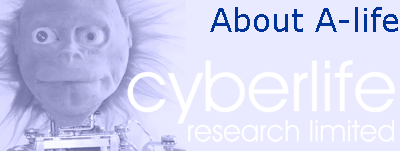
|
|
You'd have thought that artificial life would be about making artificial living things, wouldn't you? But it isn't, not really. Chris Langton, who coined the term around 1987, defined A-life as seeking to "contribute to theoretical biology by locating life-as-we-know-it within the larger picture of life-as-it-could-be". In other words, it's a way of finding out which facets of life are essential characteristics, and which are merely accidental or contingent consequences of the history and chemistry of life on this particular planet. It does this using computer simulation, looking to see if the elements of the simulation are sufficient to produce the effects seen in nature. Most A-life work doesn't try to create actual organisms at all - it focuses on one particular aspect of life, such as evolution or biochemistry. There have been many attempts to synthesize more-or-less complete organisms, but again these are not usually intended to be actual living things, only models of living things. Nevertheless, A-life does have philosophical roots that make the concept of truly living artificial systems completely permissible. Chief among these is the idea that life is a process, not some kind of metaphysical substance or an atomic property of matter. If life is a process then it is possible for it to emerge from more than one kind of substrate - even a virtual one in a computer - just as many kinds of instruments are capable of making music. Mathematically speaking, A-life is about systems that generate increasing complexity. Artificial evolution, for example, can cause highly ordered and complex structures to emerge spontaneously from collections of very much simpler components. Emergence is, in fact, the most important concept in A-life. An emergent property is a property of a system that is not a property of any of its parts. Wetness is an emergent property, since water is wet but individual water molecules are not (the concept is meaningless at this level of description). Emergence is not magic - it is just a consequence of the fact that objects at one level of description can interact with each other to produce phenomena that are properties of the system as a whole. Mob behaviour is an emergent property of crowds of people. There's nothing magical about it; it's simply that a crowd is a different kind of system than a person. The universe is thus an endlessly inventive place. Once a new level of description emerges (as subatomic particles 'discovered' how to make atoms, say) it makes even higher levels of description possible that weren't possible before (atoms permit molecules, which permit chemistry, which permits biology). All of this has a bearing on artificial intelligence, even though intelligence is one of the least studied lifelike phenomena in A-life. |
Copyright © 2004 Cyberlife Research Ltd. |